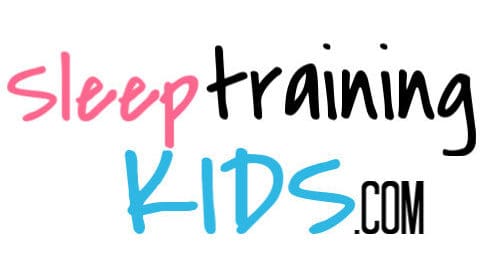When I was considering sleep training each of my kids, I discussed it with their pediatrician first.
With each child, I wanted to know – was sleep training pediatrician recommended? Pediatricians recommend behavioral-based sleep training for families with significant sleep disruption, provided the baby is at least 4-6 months of age.
In other words, talking with your pediatrician is a great first step to take. Let’s talk about when they do and don’t recommend sleep training – with examples.

When Pediatricians Recommend Sleep Training
Pediatricians recommend behavioral-based sleep training to families with moderate to serious sleep disruption. However, in order for sleep training to be effective, the baby needs to be at least 4-6 months of age, both physically and developmentally.
If you’re like me, tables can help make things clearer. Let’s look at what pediatricians recommend. These answers come from doctors I’ve worked with, those I’ve surveyed, and what they say in sleep books.
| Situation: | Will the Pediatrician Recommend Sleep Training? |
|---|---|
| The Baby’s Physical and/or Developmental Age is LESS than 4+ Months | Not yet. |
| The Baby’s Physical and Developmental Age is MORE than 4+ Months | Sleep training is doable. The recommendation will depend on the family’s level of sleep disruption. |
| The family is experiencing no-to-little sleep disruption. | Sleep training is up to the parents. |
| The family is experiencing moderate sleep disruption. | Sleep training may be recommended but is still up to the parents. |
| The family is experiencing severe sleep disruption. | Sleep training is recommended. |
Pediatrician groups, like the American Academy of Pediatrics, regularly study important topics like sleep training. Here’s a 2012 study’s result that recommends sleep training:
Parents and health professionals can feel confident using behavioral techniques for managing infant sleep.
Study: Infant Sleep Training is Effective and Safe (AAP, 2012)
If you’d like to read more about what behavior sleep training is, make sure you read my article on it right here.
Why Pediatricians Recommend Sleep Training After 4-6 Months Old
By about 4-6 months of age, most babies can sleep for several hours at a time. The exact number of hours at night (or in one stretch) can still vary greatly – anywhere from 4 to 8-10 hours.
However, by waiting for the baby to reach this age, they’ve passed the critical “fourth trimester” and have settled into a more reliable (and more adult-like) sleep pattern.
Note: Some babies may need to be older than even the 4-6 month general guideline – depending on their individual development, family situation, and health history.
Next, let’s go over some examples of when pediatricians do recommend sleep training.
Examples: When Pediatricians Recommend Sleep Training
Pediatricians regularly recommend sleep training to exhausted families.
Example 1: a 12-month-old child wakes up an average of 10+ times each night. Everyone is exhausted. At the 1-year well-child checkup, the pediatrician notices how tired everyone acts. They immediately recommend an appropriate behavioral-based sleep training program for the family.
In my own experience, each of our 4 kids experienced significant sleep disruption – and so did we as parents. We were up multiple times each night. Each baby required multiple feedings, required physical touch to be put back to sleep, and awoke far too easily from sleep (both at night and during naps).
By 6-7 months of age, my husband and I were both beyond exhausted. At the next well-child checkup, our pediatrician highly recommended behavioral sleep training – so that we could regain a functional level of family life.
Example 2: an 8-month-old girl who previously slept well, experiences a sleep regression. Unsure if the child has an ear infection, the mother takes the girl to see her pediatrician. After a normal exam, the pediatrician clears the little girl as healthy and recommends that the mom looks into sleep training.
With our 4th child (a daughter) we did change things differently. We did an experiment in physician-approved cosleeping up until she was about 7 months old. We got better sleep (and so did our daughter!) – and were able to delay sleep training by several months.
The pediatrician still recommended sleep training in her case, though, because of our family history of difficulty sleeping.
Example 3: An 18-month-old boy has begun waking up 5-6 times each night and requires extensive soothing to go back to sleep. The family asks the pediatrician if sleep training could help. The doctor recommends several behavior-based sleep training methods.
When Pediatricians Do NOT Recommend Sleep Training
Pediatricians do not recommend sleep training in a handful of specific instances. These times include:
- When an infant is too young physically
- Any time an underlying medical need needs to be addressed first
- When an infant is too young developmentally
- Any time that unsafe or unapproved sleep training methods are being used
Let’s go over why these recommendations exist.
Why Pediatricians Don’t Recommend Sleep Training Before 4-6 Months Old
Babies less than 4-6 months of age still require regular nighttime feedings. On average, babies at this age can only eat about 3-4 ounces of milk. In order to get enough calories to grow, they have to eat around the clock.
Let’s cover some specific examples:
Parents of a 2-month-old baby, who eats every 3 hours, are exhausted. They ask their pediatrician if they can safely and successfully sleep train their newborn. Because the baby requires those calories to grow, the pediatrician recommends that the parents wait at least 2-4 months before using a behavioral sleep training method.
In cases like these, a pediatrician may instead recommend that the parents reach out to reliable and trustworthy family and friends for help.
Other Times Pediatricians Don’t Recommend Sleep Training
When an infant is on a delayed developmental schedule, pediatricians will not recommend sleep training. For example:
A 4-month-old premature baby (whose adjusted or corrected age is really only 2 months) isn’t sleeping well. The parents are exhausted. However, due to the baby’s adjusted age, sleep training won’t be effective yet. Doctors won’t recommend it for at least another 2-4 months.
Another time pediatricians won’t recommend sleep training is when there is an underlying medical concern that needs to be addressed first.
An 8-month-old baby with FTT (Failure To Thrive) still requires feedings every 2-3 hours and isn’t sleeping well. The baby has a health plan in place to address the FTT with increased feeds via a feeding tube. At this time, the pediatrician does not recommend sleep training.
In a medical case like this, though, a home health nurse may come help out the family.
Finally, pediatricians will never recommend unsafe or unapproved sleep training methods.
Exhausted parents, who are unable to cope, leave their children to cry for hours at a time unattended. As a result, the baby develops a severe diaper rash and stops crying (or reacting to people) in general. When pediatrician is made aware of this particularly neglectful situation, they are required to call it to the proper authorities.
Leaving a child unattended to cry for a few minutes is completely different than ignoring them altogether.
- A pediatrician will recommend leaving a child to cry for a few minutes so that a parent can collect themselves and prevent a rash reaction (especially during the period of purple crying).
- A doctor will never recommend leaving the child alone or neglecting them.
Child abuse, including neglect, is something that pediatricians and healthcare providers are required to report to the proper authorities.

What Pediatricians Want Parents to Know About Sleep Training
Finally, pediatricians want parents to know two important things about sleep training.
- First: behavioral sleep training is safe (and has a net positive outcome on short-term sleep issues and maternal depression).
- Second: every situation is different and worth consulting with your pediatrician.
Your pediatrician is there to serve as a resource – so don’t be afraid to ask them about sleep training. An individual pediatrician’s knowledge about sleep training may vary, but every pediatrician wants to help the children they care for.
So as you’re considering sleep training, know that pediatricians do recommend sleep training. And it’s totally fine to talk to your pediatrician about your specific needs and questions related to sleep training.
Related Questions
What Is the Best Age to Sleep Train a Baby? It’s best to sleep train a baby whenever they need it, as long as they are at least 4-6 months old (both physically and developmentally).
Will Sleep Training Harm My Baby? Sleep training, done right, is entirely safe for the entire family. To read more on this subject, be sure to read my article on sleep training safety right here.
What Is the Safest Way for a Newborn to Sleep? The safest way for a newborn to sleep is on their back. Newborns need their own sleeping space, clear from toys and blankets that can quickly become a hazard.
Sources
- American Academy of Pediatrics (Ed.). (2012, September 10). Infant Sleep Training is Effective and Safe, Study Finds. Retrieved August 26, 2019, from https://www.aap.org/en-us/about-the-aap/aap-press-room/pages/Infant-Sleep-Training-is-Effective-and-Safe-Study-Finds.aspx
